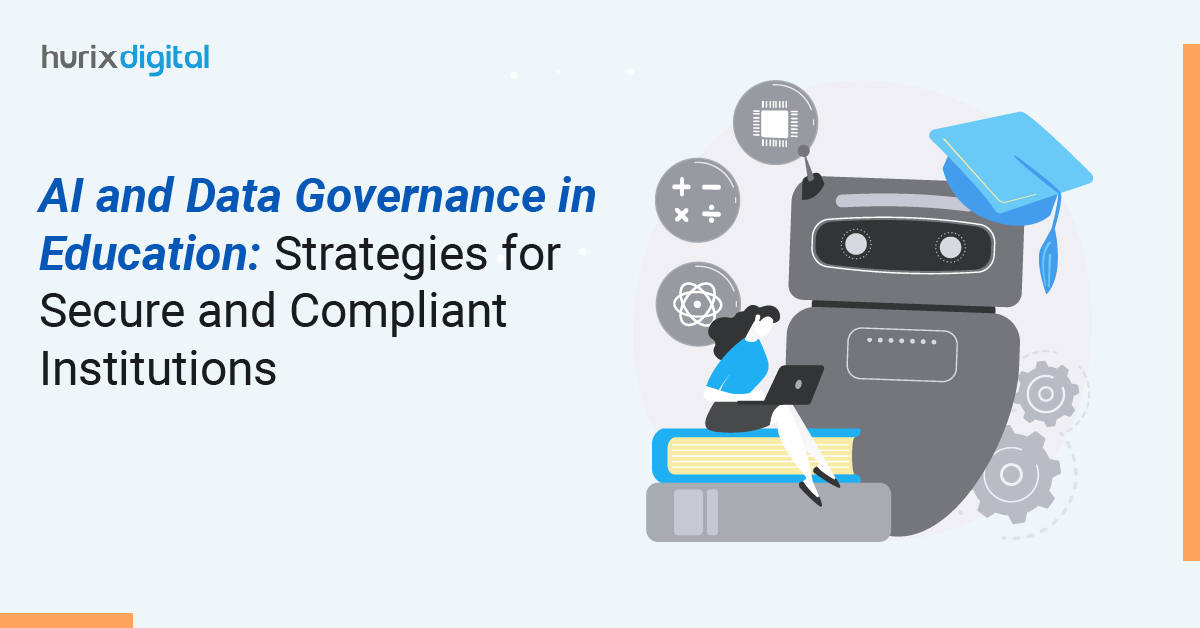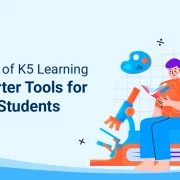
AI and Data Governance in Education: Strategies for Secure and Compliant Institutions
Summary
This blog highlights the importance of robust data governance in educational institutions, addressing challenges and best practices for secure, compliant data management in the AI era.
In today’s evolving educational landscape, the importance of data governance cannot be overstated. As schools and universities increasingly integrate artificial intelligence into their operations, the need for meticulous data management becomes paramount.
Data governance encompasses much more than simple data storage. It includes ensuring accuracy, protecting data, and adhering to regulatory standards.
A recent study forecasts that the AI market in the education sector will surge from $3.79 billion in 2022 to $20.54 billion by 2027, demonstrating a CAGR of 45.6%. This rapid growth underscores the critical need for robust governance structures that can keep pace with technological advancements.
Effective data governance frameworks secure data integrity and enhance decision-making capabilities through AI-powered analytics. As such, establishing a robust data governance strategy is imperative for creating a secure, compliant, and efficient educational environment.
In this blog, we’ll explore key strategies and practices that educational institutions can adopt to ensure their data governance is up to the challenges of the modern AI era.
Table of Contents:
- Understanding Data Governance in Education
- Key Challenges in Implementing Data Governance
- AI-Driven Data Security: Protecting Sensitive Information
- Best Practices for Data Governance
- Frameworks for AI and Data Governance
- Leveraging AI for Enhanced Data Analytics
- Conclusion
Understanding Data Governance in Education
Data governance in education involves overseeing data availability, usability, integrity, and security in educational organizations. Essentially, it encompasses the measures and systems utilized to manage educational data responsibly.
Data governance is crucial in this industry. It guarantees that schools adhere to legal requirements while maximizing data utilization to improve student results and operational effectiveness.
Integrating AI-powered data security into these governance frameworks enhances protection, safeguarding sensitive student data from new cyber threats. Additionally, abiding by Educational Data Compliance assists schools in navigating the intricate network of rules that oversee data privacy and usage.
Implementing robust AI and data governance frameworks results in a secure and accessible data environment. This enables organizations to use AI-powered data analytics to acquire information that guides strategic decisions and improves educational services.
Also Read: 10 Best Online Teaching Platforms to Start Your Teaching Career
Key Challenges in Implementing Data Governance
Implementing data governance in education presents unique challenges, particularly for CIOs and CTOs who are at the helm of technological advancements in educational institutions. Here are some common hurdles they face:
1. Complex Regulatory Environment
Navigating the laws and regulations related to educational data compliance can be daunting. Each regulation demands strict adherence, complicating data management.
2. Integration of AI Technologies
Incorporating AI-driven data security and AI-powered data analytics requires advanced technical strategies. Ensuring these technologies align with existing systems adds complexity.
3. Ensuring Data Integrity
Maintaining the accuracy and consistency of educational data is critical for upholding data integrity in educational institutions.
4. Resource Constraints
Limited budget and manpower hinder the implementation of effective data governance frameworks and lead to prioritization dilemmas.
5. Cultural Resistance to Change
Instituting a culture that embraces data-driven decision-making and governance can meet resistance from staff accustomed to traditional methods.
6. Data Silos
Breaking down data silos to ensure seamless data flow across various departments remains a persistent challenge. Effective risk management and governance depend on such seamless data integration.
In 2023, 29% of K12 school attacks were due to vulnerability exploitation, while phishing campaigns accounted for 30%. This underscores the growing importance of using AI technology in data security to address escalating threats.
AI-Driven Data Security: Protecting Sensitive Information
In the field of data governance in education, ensuring AI-driven data security is crucial for protecting sensitive information. Below are the ways artificial intelligence enhances data security measures:
- Automated Threat Detection: Artificial intelligence algorithms are highly effective at recognizing possible security risks in live situations. Proactive strategies are essential for ensuring the security of student and staff data.
- Enhanced Encryption Methods: AI can create intricate encryption keys that are hard for hackers to decipher, thus improving encryption techniques. This ensures data protection while stored and during transfer.
- Behavioral Analytics: AI systems scrutinize user behavior to detect unusual activities that might indicate a security breach. Early detection of such anomalies is key to preventing data leaks and safeguarding sensitive information.
- Access Control Improvements: AI helps improve access control systems by adjusting to evolving risk situations. By using real-time evaluations, it guarantees that only approved individuals can access confidential data.
- Automation of compliance: AI tools streamline compliance procedures, ensuring consistent conformity with educational data compliance standards without manual supervision.
According to IBM’s report, organizations that extensively use security AI and automation for prevention report average cost savings of $2.22 million compared to those that do not. AI-enhanced security measures can reduce these risks by proactively identifying vulnerabilities and automating compliance checks.
Best Practices for Data Governance
Effective data governance in education requires strategic planning and robust implementation. Here are actionable best practices tailored for educational institutions to enhance their governance frameworks:
1. Establish Clear Data Governance Policies
Define roles and responsibilities for data management within educational institutions. These policies must be comprehensive and communicated across all levels of the organization, ensuring consistent implementation.
2. Implement Data Quality Standards
High criteria for data accuracy and completeness are essential for successful data governance. Educational institutions need to routinely carry out audits to ensure that these standards are upheld and that the data remains beneficial for informed decision-making.
3. Develop a Data Governance Framework
A robust data governance framework is essential. Such a framework should incorporate AI that leverages advanced tools and procedures for data security, quality control, and regulatory compliance, catering specifically to the unique needs of educational environments.
4. Regular Training and Awareness
Continuous education and training are crucial to make sure all employees know the data governance policies and grasp the importance of data security. These meetings assist in creating an informed team that can recognize and address possible data problems before they become more serious.
5. Leverage AI for Data Security
Utilizing AI-powered data security can improve a company’s capacity to identify and address potential risks. AI technologies facilitate the proactive monitoring and analysis of data usage patterns, helping to prevent unauthorized access and potential breaches.
6. Data Compliance Monitoring
Continuous monitoring of data processes is crucial for adhering to regulations in the education sector. AI tools excel at automating these checks and simplifying the reporting process, ensuring that institutions meet regulatory standards with reduced manual intervention.
7. Integrate Data Risk Management Practices
Recognizing possible dangers and weaknesses is a proactive method for managing data. Institutions need to create thorough plans to reduce these risks, consistently reassessing and adapting necessary steps to combat new and changing dangers.
8. Utilize AI-Powered Data Analytics
AI-driven data analytics enable educational institutions to more effectively interpret their data, aiding in strategic decision-making and policy development. This technology is valuable for identifying inefficiencies and enhancing governance practices.
Frameworks for AI and Data Governance
Effective AI and data governance frameworks are essential for integrating AI into data governance strategies within educational institutions. Here are vital frameworks that support this integration:
- Control Objectives for Information and Related Technologies (COBIT) ensures that IT goals are aligned with strategic institutional objectives and that AI technologies improve data governance and compliance.
- ISO/IEC 38500 offers guidance for governing bodies on incorporating it, including AI, into their organizations, with a focus on robust governance and data integrity within educational institutions.
- DAMA-DMBOK, which stands for Data Management Body of Knowledge, offers established guidelines for data management that can be adapted to include AI-based technologies, enhancing security and decision-making abilities.
- Although the principles of the General Data Protection Regulation (GDPR) are exclusive to the EU, they have a broad impact worldwide. They stress the importance of safeguarding personal information by implementing responsible data management techniques, which include ensuring AI compliance in education.
- NIST framework provides standards and guidelines for educational institutions to safeguard their information systems, which is essential for incorporating AI-driven data security measures.
Leveraging AI for Enhanced Data Analytics
Leveraging AI-powered data analytics can significantly transform data handling and decision-making processes. Here’s how AI facilitates these changes:
- Predictive Analytics: AI tools analyze historical data to forecast future trends. Such capabilities enable educational institutions to address potential challenges and adapt strategies for student success proactively.
- Personalized Learning Experiences: AI can analyze student data to personalize educational content based on individual learning styles and needs, improving engagement and results.
- Efficiency in Data Processing: AI speeds up the handling of extensive data sets, enabling instantaneous data analysis. This timely access to data-driven insights supports more informed and swift decision-making.
- Enhanced Data Security: By incorporating AI-driven data security measures, AI analytics tools can identify and mitigate potential threats in real-time, safeguarding sensitive educational data.
- Compliance Monitoring: AI assists in ensuring that data practices comply with educational data compliance standards by automating data audits and promptly reporting discrepancies.
Also Read: How Higher Education Can Prepare Students for Emerging Careers?
Conclusion
Robust data governance in education is the foundation for securing and optimizing educational environments in the AI era. Institutions that integrate AI-driven data security and employ comprehensive AI and data governance frameworks can achieve higher standards of Data Integrity.
These techniques, combined with AI-driven data analytics, enable institutions to make well-informed choices, uphold compliance, and improve educational results. By adopting these best practices to navigate the complexities of educational data compliance, educational institutions can lead the way in innovative educational advancements.
Consider Hurix Digital to explore how these practices can be tailored and implemented within your institution. Connect with us to help you harness the power of data governance to transform your educational strategies.

Currently serving as the Vice President of Technology Delivery Operations at HurixDigital, a prominent global provider of digital content and technology solutions for publishers, corporations, and educational institutions. With over 16 years of experience spanning EdTech and various domains, I hold certification as a SCRUM Product Owner (CSPO). My expertise includes operations, finance, and adept people management skills.




